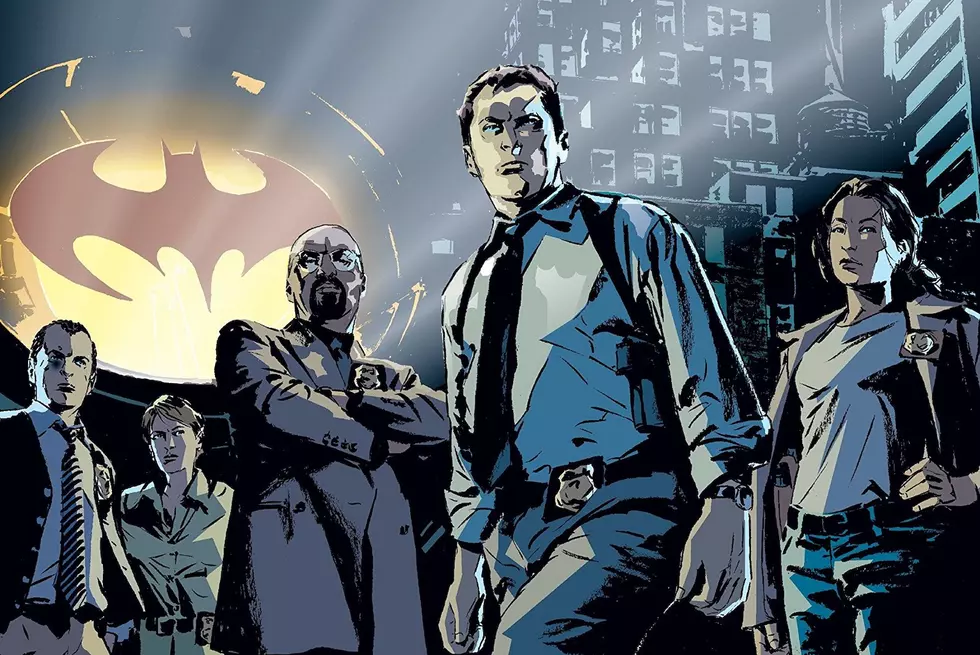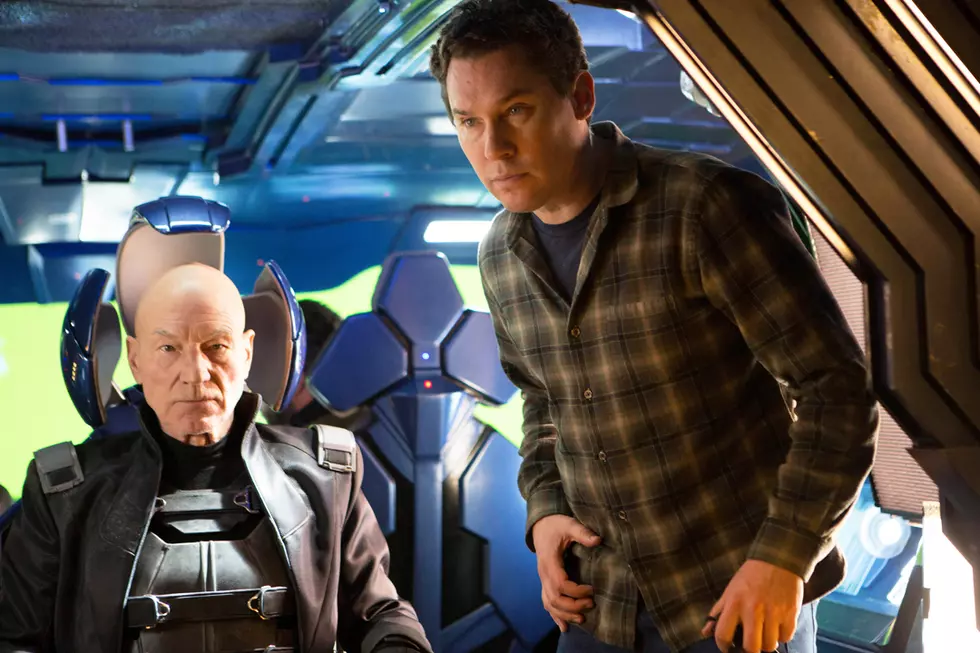
‘Gotham’ Season 1 Recap, Episode 5: ‘Viper’
The news that actress Morena Baccarin (Firefly, Homeland) will be joining Fox’s crime drama Gotham, with a recurring role as the compassionate physician Dr. Leslie Thompkins, brings hope to a show currently heaving with villainy. Considered a surrogate parental figure to young Bruce Wayne, the good doctor appeared in over 200 issues of DC Comics and several episodes of Batman: The Animated Series. However, Dr. Thompkins has never been portrayed in a live-action film or television show. In the meantime, Bruno Heller’s Gotham appears to suffer from too much of the same motif: The murder of mother Martha Wayne and father Thomas Wayne was a catalyst, giving way to a city of “orphans” forming replacement relationships best described as disrupted, disloyal, or enmeshed.
Alfred Enables Bruce
This week’s episode opens with young Bruce Wayne (David Mazouz) creating an elaborate crime map on the wall of his study, like 12 year-olds tend to do. Alfred (Sean Pertwee), Bruce’s butler and surrogate parent since the murder of Thomas and Martha Wayne in episode 1, encourages Bruce to take a break from his afternoon of forensic criminology. “I’m busy,” Bruce drones, hyper-focused on his case files. Alfred pushes, “what if this is a complete waste of time? What if you never discovered who killed your mom and dad? What if you never get to wreak revenge?” Bruce looks up at him to clarify his motives: “I don’t want revenge. I want to understand how Gotham works.” Ok, so no hard feelings about the murder of your parents. “Take the Arkham Project for instance,” Bruce continues, knowing that the Falcone and Maroni mob families profited from the legislative decision surrounding the fate of the Arkham District. “I know City Hall is corrupt, but why didn’t Wayne Enterprises do something?” Yes, Baby-Batman. Why didn’t Wayne Enterprises do something? Also, why aren’t you in school?
“Can you pass me that blue folder over there?” Fine, fine. It’s clear that Gotham’s writers need us to know that Bruce is determined to devote all his waking hours to studying the city’s intertwined legal, corporate, and political systems. The problem? Children that have astonishing islands of ability or brilliance at this level are typically prodigious savants. It’s the intensity of Bruce’s focused interest in criminology that seems more akin to the obsessiveness seen in children with Autism Spectrum Disorders. Children who have high functioning Autism (formerly known as Asperger’s Syndrome) tend to present with intensely focused interests (also called circumscribed interests). Like Bruce, a child with a focused interest is drawn or driven to it, often “zones out” on it, spending hours upon hours engaged in the activity, unknowingly replacing social interactions with fascinated thoughts about impersonal relationships: numbers, maps, cooking ingredients. Alfred points out, astutely, “I suppose as hobbies go, this is better than grilling yourself like a bloody pork chop…Still, not particularly healthy is it?”
What’s the harm in Bruce’s obsession with Gotham crime? True: Self-harm, suicidal gestures, and recreation of violence are some common behaviors following tragic loss during adolescence, ones that would certainly be more alarming than Bruce’s current prosocial psychological presentation. Also true: Altruism has been cited by researchers as an outcome of trauma involving personal loss. Combat soldiers, Holocaust survivors and other individuals who have lived through the unimaginable have demonstrated achievements “born of suffering,” becoming empowered, not ruined, by their tragic experiences. This doesn’t occur overnight; often, post-traumatic growth—known as positive psychological changes as a result of struggling with extremely challenging crises—involves the reprocessing of the trauma at a neurocognitive level. Though it may take years for a person to experience this transformation, the end result is often an increased appreciation for life and a sense of personal strength.
It would seem that Bruce is on an accelerated path to post-traumatic growth. So it’s worth asking: Has young Bruce Wayne actually had an opportunity to develop a greater than usual sensitivity to suffering? Has he lived experiences that led to increased empathy for all others who are victimized, a newly found sense of responsibility for others’ well-being and an enlarged capacity for caring? Given more problematic symptoms we’re seeing—emotional numbing, social isolation, lack of same-aged peers, school avoidance and disrupted sleep, we might posit that he’s not yet in a place of psychological recovery.
Frustrated with the piles of files cluttering the study, Alfred huffs that he has “half a mind to stick all the lot into the bloody fire.” But he realizes a potential for Bruce’s special interest: Wayne Enterprises is hosting a charity ball. He offers to take Bruce to the event. Of course, Bruce agrees. After all, he has “some questions for the members of the board about shell companies, off-shore accounts” and the like. Seriously? The villain of the week grabs the attention of Alfred and Bruce when a news story breaks: “Viper grips Gotham.” There’s a mysterious drug being distributed in downtown Gotham. People who are given the drug (street artists, prostitutes and the homeless) “acquire great strength and a euphoric sense of power for a few hours. Then they die a horrible death.”
Bad Things Only Truly Happen When They Happen to Important People
The neurochemistry of “Viper” is later explained by Edward Nygma (Cory Michael Smith) to dumbfounded GCPD detectives. “It’s quite remarkable,” Nygma gleams. “Viper activates unused DNA. The body starts to burn calcium from the skeletal system as fuel…their bones crumble, and they suffocate and die.” Nygma, more curious than disturbed by the drug’s impact, finds it exhilarating when a doped-up prostitute is brought into the station and collapses to her death.
Though there’s a pursuit initiated by Detectives James Gordon (Ben McKenzie) and Harvey Bullock (Donal Logue), it takes only a few (unremarkable) steps for the detectives to discover who is distributing the deadly drug: a biochemist who was terminated from the pharmaceutical company WellZyn. Viper, it turns out, was an earlier form of Venom, a strength-enhancing super-steroid mentioned in comics as the muscle-altering stimulant used by Bane.
Meanwhile, Alfred and Bruce arrive at the charity event for WellZyn and Wayne Enterprises. In this scene, Bruce is propped on a chair interviewing an affluent woman involved with the board. She explains that she’s actually not a member of the board. “They’re very busy people, Bruce. Your family created a company worth billions.” But Bruce persists, “I found what looked like serious irregularities in the Arkham Project.” Did you, now? What would a regularity look like to a 12-year-old?
Bruce demands to speak to someone who serves on the board. No can do. Board members “prefer to consult with minors through the usual legal mediation.” This is a good lie because it’s in a language Bruce can understand. The next moment, the Viper supplier appears on a giant screen behind Bruce in a pre-recorded message to the wealthy charity attendees. “Bad things only truly happen when they happen to important people. Like you.” It’s not that chilling. Nonetheless, the man sends green fumes into the ballroom through air vents, pumping the Viper toxin into the crowd. Alfred immediately tosses his jacket onto Bruce’s head and they escape. It’s Gordon and Bullock who trap Viper’s maker on the roof. He’s a disposable character, so, like many criminals on the show, Viper’s creator doesn’t make it.
Back at Wayne Manor, Bruce realizes the woman he was interviewing at the charity event was indeed hiding something. He miraculously locates a WellZyn memo with an 8 x 10 photograph of the supposed “middle manager” at Wayne Enterprises. Alfred sits with Bruce and begins rifling through case files, perhaps realizing that the kid’s onto something after all, but also knowing it may be the only opportunity to form a meaningful relationship with him. Now that the show has established Bruce’s focused interests in forensics and Alfred’s acceptance of his newly adopted prodigy, perhaps we won’t have to see much of them in future episodes. Somehow, I doubt that.
The Penguin’s New Nest
Disappointingly, Oswald Cobblepot (Robin Lord Taylor) only has a couple short, greasy-haired scenes in this episode, none related to the Viper incident. In a lapse in judgment, he approaches mob boss, restaurateur and newfound father figure Maroni with a confession. “I’m not just a dishwasher,” Oswald begins. “My real name is Oswald Cobblepot and I used to work for Fish Mooney…until she tried to kill me.” He lets out an anxious chuckle, but Maroni bashes his head into the clothed table, stunning him.
Oswald’s mistake wasn’t one of impulsivity, per se. He erroneously believed that Maroni would take him under his wing unconditionally. Oswald perceives interpersonal closeness that isn’t truly real; he fabricates a trusting relationship with others based on immature, simplistic conceptualizations of intimacy. His creepy attempts to form an alliance with Detective Gordon (inappropriately visiting Gordon at Barbara’s home, phoning him at his workplace) show that Oswald is desperate for parental approval. Rather than see them as deficits, we could interpret Oswald’s fragile boundaries as indicative of his “unmet needs:” his need to trust and be trusted back, his need to feel safe and secure. Like a male Emperor Penguin who guards his sole egg, Maroni should protect him. It is Maroni, after all, who tells Oswald to accept his nickname, “Penguin,” because it suits him. Penguin agrees, receiving approval from his adoptive caretaker.
Later, Maroni’s assistant Frankie retrieves Detective Gordon from the police station. Learning that Maroni now has Penguin in his camp (if Falcone discovers Penguin is alive, he’ll know that Gordon betrayed his order to murder him), he complies with Frankie’s request. At the Italian restaurant, Maroni confronts Gordon, ordering him to tell the “same” story that Oswald told him. “If I don’t like what I hear, slice his face,” he orders his assistants, who press Oswald’s face to a meat slicer. Though reluctant to play Maroni’s game, Gordon matches Oswald’s story. “It’s delicious,” Maroni bellows, bringing Oswald back to their table. Oswald mouths “thank you” to Gordon as Maroni feasts on his lobster. “Let’s get you cleaned up…look at you!” he tells Oswald, just short of patting him like a pet.
Fish’s Secret Weapon
Though last week’s bizarre girl-fight remains an unnecessary scene, Fish Mooney makes her “recruitment” of a seductive singer a bit more clear. In this episode, we realize Mooney is grooming Liz, the young, beautiful “winner” of last week’s catfight. She teaches her new apprentice new expressions, lines and intonations very similar to her own “motherly” style. Their scenes are uncomfortable and forced. Mooney slaps and caresses Liz, mewing, “You might be my baby girl, but I’m not your mamma.” OKAAAY.
Mooney ultimately teaches Liz to sing to an aria “like a mother” would—you know, soft, sultry and sexy, but not “too sexy.” Later, we see Liz post-makeover, walking on an uptown street, humming that same aria. Falcone happens to be on that same empty street. He immediately notices her and approaches. “My mother sang that song to me…” he begins, clearly moved by the young girl’s knowledge of classics. Liz pulls out one earbud, and asks if he’d like to listen with her. Apparently, the key to a man’s heart (and in Falcone’s case, his potential demise) is through the memory of his mother.
Diagnosis
Bruno Heller and Co. have made it abundantly clear that Gotham is a grand look at parental relationships, with a lean toward Freudian psychology. Unfortunately, the theme grows sour quickly, and a more complex consideration of what drives people, both in the direction of good and evil, is needed to keep another 17 episodes afloat.
More From ComicsAlliance









